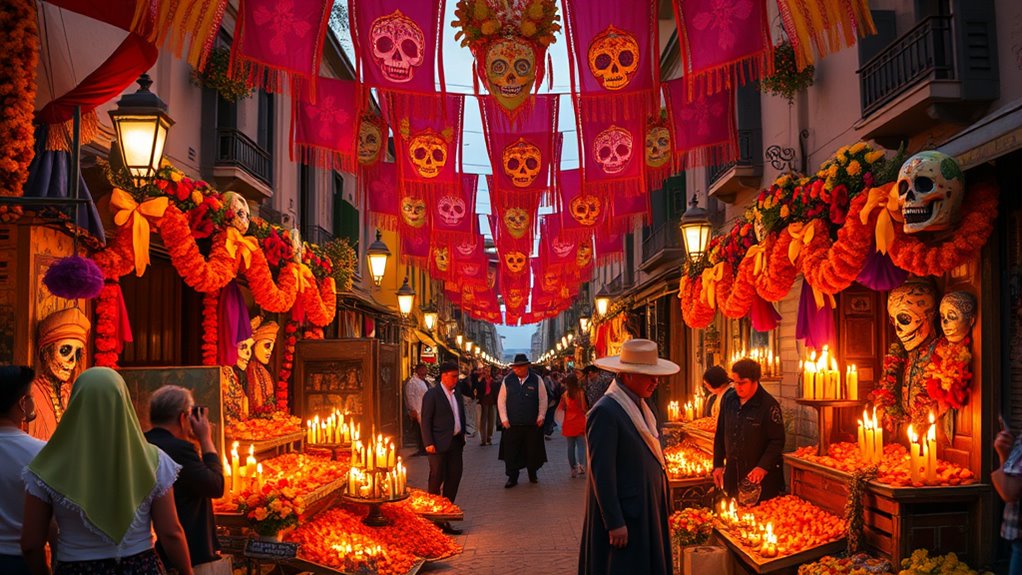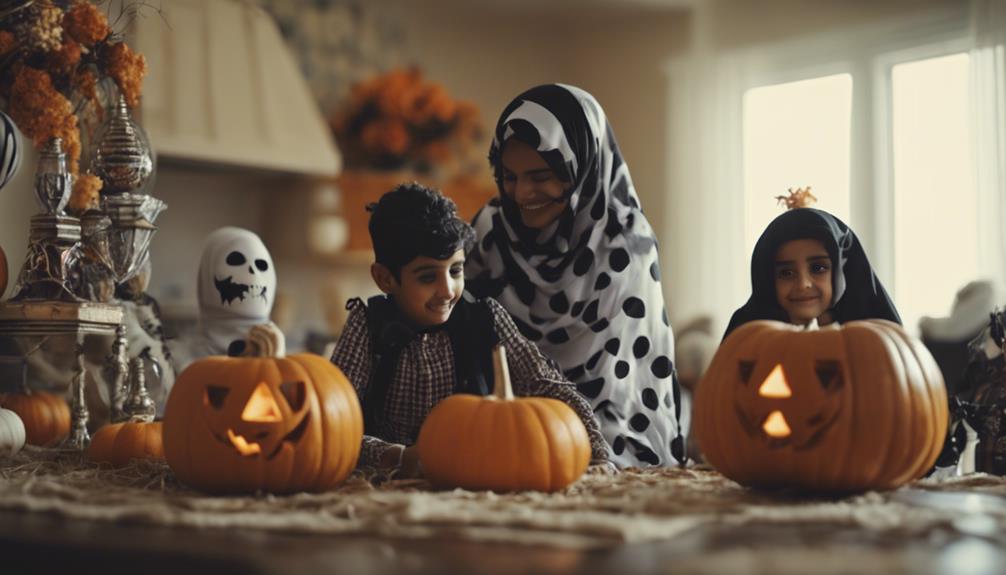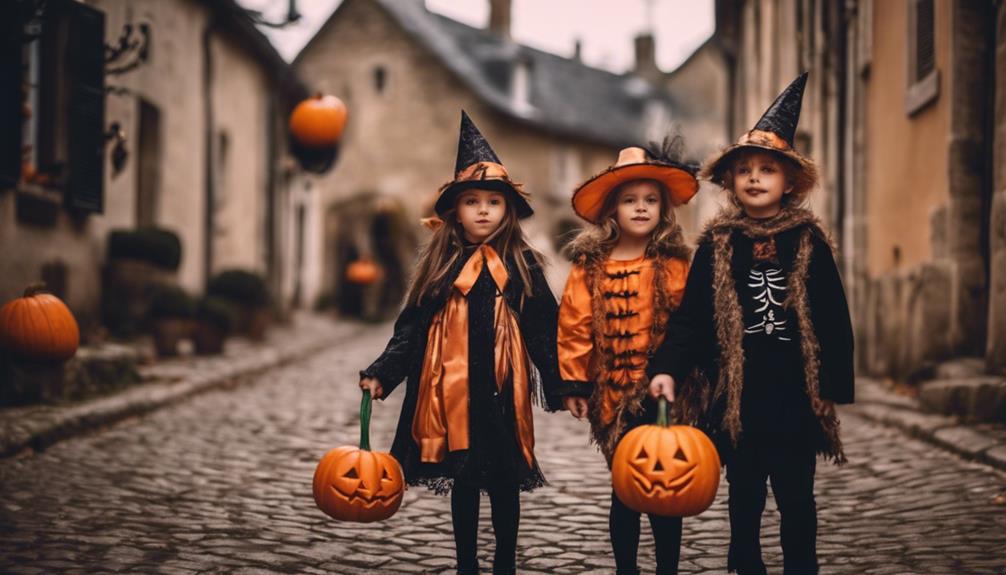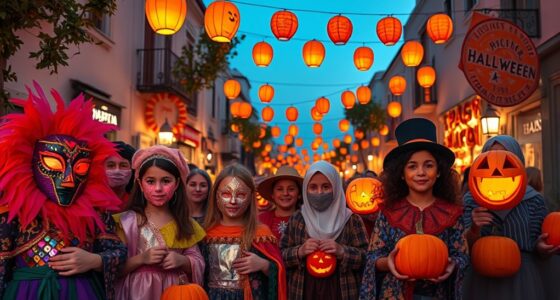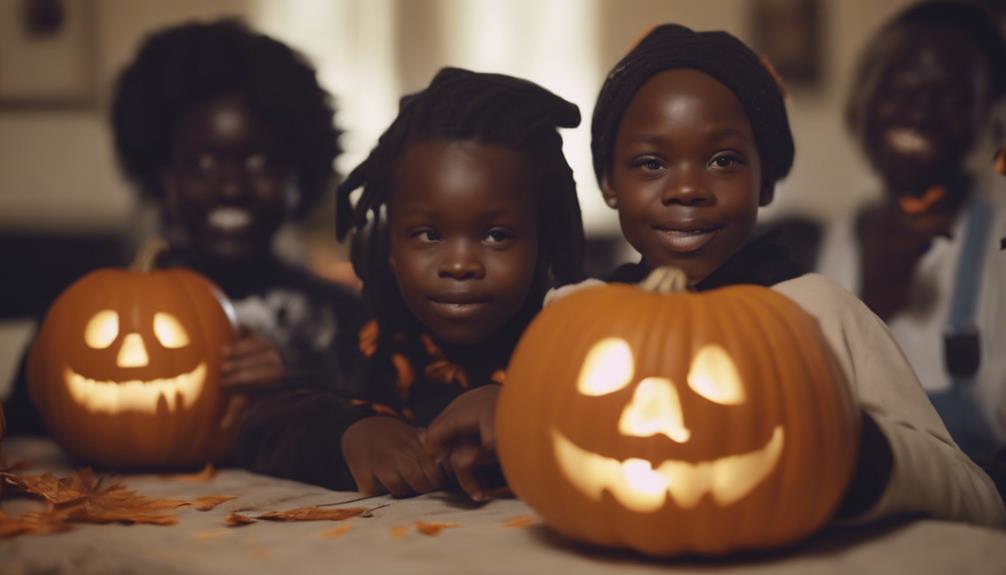Festivals of the Dead worldwide are vibrant celebrations that honor ancestors through rituals, symbols, and joyful gatherings. You’ll see traditions like offering food, lighting candles, and decorating graves or altars, all emphasizing cultural bonds and spiritual beliefs. These festivals often include music, dance, and storytelling, transforming mourning into lively tributes. Each culture has unique practices, but all share a universal desire to remember, respect, and connect with those who came before. If you continue exploring, you’ll discover even more fascinating traditions behind these meaningful events.
Key Takeaways
- Festivals of the dead are cultural celebrations honoring ancestors through rituals, offerings, and symbolic acts worldwide.
- Common practices include lighting candles, offering food, and decorating cemeteries to connect with spirits.
- Celebrations are vibrant, incorporating music, dance, storytelling, and visual displays like marigolds or sugar skulls.
- Examples include Mexico’s Día de los Muertos, China’s Hungry Ghost Festival, Ghana’s Homowo, and the Philippines’ All Saints’ and All Souls’ Days.
- These festivals foster communal bonding, cultural identity, and spiritual remembrance across diverse societies.
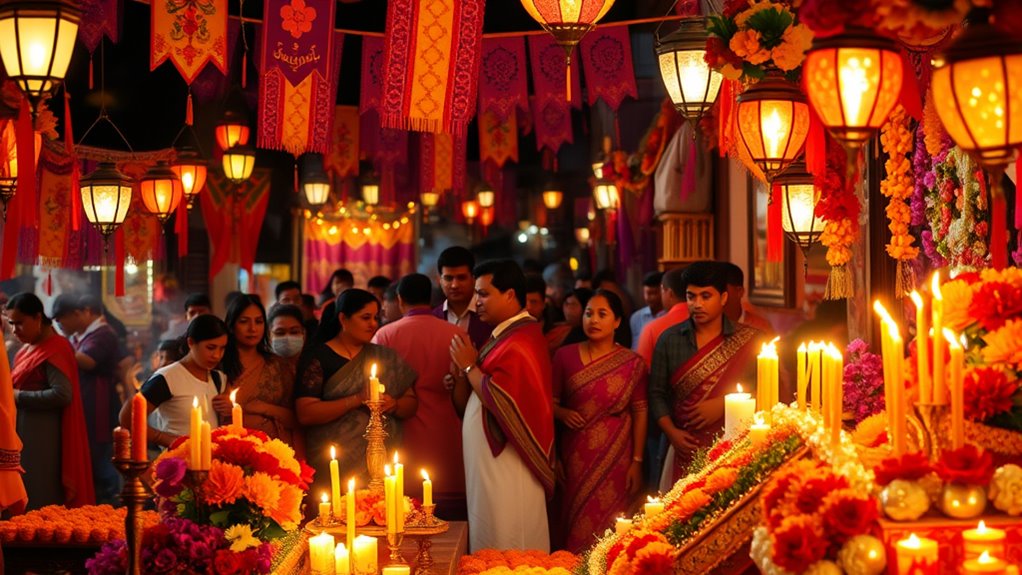
Have you ever wondered how different cultures honor those who have passed away? Across the globe, communities come together to celebrate their loved ones through various festivals of the dead, each rooted in deep traditions and unique beliefs. These festivals often involve ancestral rituals, where families pay homage to their ancestors, showing respect and gratitude for their guidance and protection. Such rituals might include offering food, lighting candles, or presenting personal objects, all designed to connect the living with their ancestors in a meaningful way. These acts serve as spiritual celebrations that reinforce bonds across generations and reaffirm cultural identities. Many of these festivals incorporate specific ritual practices that symbolize the ongoing connection between the living and the dead, emphasizing the importance of cultural continuity.
Celebrating ancestors through rituals and offerings, honoring bonds across generations and cultural identities.
In many cultures, these festivals are more than just remembrance—they are vibrant, lively events filled with music, dance, and storytelling. For example, in Mexico, Día de los Muertos (Day of the Dead) turns cemeteries into colorful, bustling spaces adorned with marigolds, sugar skulls, and photographs. Families gather to clean graves, offer favorite foods of the departed, and share stories that keep memories alive. This celebration transforms mourning into a joyful tribute, emphasizing the ongoing presence of loved ones in daily life. Similarly, in China, the Hungry Ghost Festival involves burning incense and paper offerings to appease wandering spirits, ensuring they find peace and do not cause trouble for the living.
In Ghana, the Homowo festival includes elaborate rituals to honor ancestors and spirits, blending traditional dance with symbolic acts meant to ward off evil spirits and invite prosperity. Meanwhile, in the Philippines, All Saints’ Day and All Souls’ Day are marked by visiting cemeteries, where families light candles and place flowers on graves, creating a quiet, contemplative atmosphere. These spiritual celebrations serve as a reminder that death isn’t the end but a transition to another domain, and that honoring those who have passed sustains cultural continuity and spiritual well-being.
Across continents, these festivals reveal a universal desire to remember, respect, and celebrate the dead. They provide a space for communal gathering, emotional expression, and cultural reaffirmation. Whether through elaborate ancestral rituals or lively spiritual celebrations, each tradition reflects a deep-seated belief that the spirits of loved ones remain part of our lives. By participating in these festivals, you connect with a collective history, experience a sense of continuity, and honor the timeless cycle of life and death. These traditions demonstrate that honoring the dead is a essential part of human culture, offering comfort, hope, and a shared understanding of mortality.
Frequently Asked Questions
How Do Different Cultures Interpret the Concept of Death?
You see, different cultures interpret death through their unique cultural beliefs and spiritual practices. Some see it as a passage to an afterlife, while others view it as a natural part of life’s cycle. You might observe rituals, offerings, or celebrations that honor ancestors. These practices reflect their understanding of death’s significance, helping them cope with loss and connect with the spiritual domain, showing how deeply cultural beliefs shape these interpretations.
What Are the Common Symbols Used in Festivals of the Dead?
Imagine vibrant altars adorned with flickering candles and fragrant flowers. You see sacred objects like skulls, candles, and incense that symbolize life and death’s cycle. Ritual costumes, often colorful and elaborate, embody spirits or ancestors. These symbols, from masked faces to paper offerings, help you connect with the departed. They create a bridge between worlds, honoring memories and inviting spiritual presence during festivals of the dead.
How Have Modern Influences Changed Traditional Celebrations?
Modern influences have markedly transformed traditional celebrations through cultural adaptation and technological integration. You might notice how social media spreads the festivities globally, allowing more people to participate virtually. Digital decorations, livestreams, and apps enhance the experience, blending old customs with new technology. These changes help preserve the essence of the celebrations while making them more accessible and engaging for diverse audiences in today’s connected world.
Are There Any Festivals of the Dead That Are Declining in Popularity?
They say, “Change is the only constant,” and you might notice some festivals of the dead are declining in popularity. Due to cultural shifts and a generational decline, younger generations often lose interest in traditional celebrations. As traditions fade, these festivals risk becoming distant memories. You can help preserve their significance by engaging with and passing down these customs, ensuring they remain meaningful for future generations.
How Do Festivals of the Dead Impact Local Communities Economically?
You see, festivals of the dead boost local communities economically by attracting cultural tourism, which increases visitors and spending. These events often support small businesses like restaurants, shops, and craft vendors, providing them with essential income. As a result, the festivals help preserve local traditions while strengthening the economy. Your participation helps sustain these cultural celebrations and benefits small businesses, creating a positive cycle of community growth and cultural preservation.
Conclusion
While these festivals celebrate the dead in diverse ways, they all remind you that honoring loved ones keeps their memory alive. Some might think it’s just tradition or superstition, but it’s really about connection and remembrance. Embracing these customs helps you appreciate different cultures and see death not as an end, but as a part of life’s ongoing cycle. So, next time you observe a festival, remember it’s about celebrating life’s continuity, not just mourning loss.
